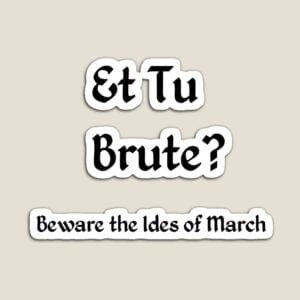Last Updated on February 27, 2024 by Iain S
“Et Tu Brute” The Ides of March
In the spirit of keeping things light for the upcoming Ides of March (Tuesday 15th this year 2024) why not wear your knowledge of Roman history with pride?
Our designs ensure you’ll stand out in the forum (or just the local coffee shop) and maybe even spark a debate on classical literature.
Beware, though, friends may start questioning your loyalty!
Whether you’re plotting to take over the empire or just planning a laid-back day, our text-based designs in classic Roman font are the ultimate conversation starters.
Let’s face it, nothing says ‘I’m historically witty’ quite like a cheeky reference to one of history’s most iconic betrayals.
Ah, the Ides of March! If you’re a history buff or a Shakespeare enthusiast, this phrase probably rings a bell.
But what’s the real story behind it? Let’s dive into the fascinating world of ancient Rome, Julius Caesar, and the phrase “Et Tu Brute” that has echoed through the ages.
1. Significance of the Ides of March in Ancient Rome
The Ides of March wasn’t always about backstabbing (pun intended) and political intrigue.
In ancient Rome, the Ides referred to the middle of the month, specifically the 15th day of March. It was a day marked with religious observances and festivals.
Think of it as just another day in the Roman calendar, with folks going about their business, attending festivals, and making offerings to the gods.
Little did they know that this particular day would go down in history for a very different reason.
2. The Historical Context: Julius Caesar’s Assassination on March 15, 44 BC

Enter Julius Caesar, the mighty leader with grand ambitions. On March 15, 44 BC, this day took a dark turn.
Caesar was assassinated in what can only be described as one of the most iconic political betrayals in history.
The Senate House became the backdrop for this dramatic event, with multiple senators, including some of Caesar’s close allies, turning against him. And this brings us to the famous phrase…
3. The Historical Warning Given to Julius Caesar

Legend has it that a soothsayer warned Caesar about the Ides of March.
“Beware the Ides of March,” he was told.
But, being the confident leader that he was, Caesar didn’t take this warning to heart.
On the fateful day, as he passed the soothsayer, he joked, “The Ides of March have come.”
The soothsayer ominously replied, “Aye, Caesar; but not gone.”
Talk about a chilling premonition!
4. The Enduring Lessons from Julius Caesar’s Assassination
Julius Caesar’s assassination teaches us about the fragility of power and the consequences of unchecked ambition.
His death marked the end of the Roman Republic and the dawn of the Roman Empire.
The phrase “Et Tu Brute,” believed to be Caesar’s last words as he saw his friend Brutus among his assassins, encapsulates the ultimate betrayal.
It reminds us that power dynamics, trust, and loyalty are as relevant today as they were in ancient Rome.
5. Contemporary Meaning of Et Tu Brute
Fast forward to today, and the phrases Ides of March and Et Tu Brute have taken on broader meanings.
They symbolize betrayal, a turning point, or a significant event that changes the course of history.
Whether it’s in literature, movies, or everyday conversations, these phrases serve as a reminder of the past and its influence on the present.
In the world of business, politics, or personal relationships, the lessons from the Ides of March are clear: Trust is fragile, power is fleeting, and history has a way of repeating itself.
So, the next time March 15th rolls around, take a moment to reflect on its significance and the timeless lessons it offers.
6. Shakespeare Julius Caesar Quotes
Beware the Ides of March.
(Soothsayer, Act 1 Scene 2)
Et tu, Brute?—Then fall, Caesar.
(Caesar, Act 3, Scene 1)
Men at some time are masters of their fates.
The fault, dear Brutus, is not in our stars
But in ourselves, that we are underlings.
(Cassius, Act 1 Scene 2)
Yond Cassius has a lean and hungry look:
He thinks too much: such men are dangerous
(Caesar, Act 1 Scene 2)
But, for mine own part, it was Greek to me.
(Casca, Act 1 Scene 2)
Let’s carve him as a dish fit for the gods.
(Brutus, Act 2 Scene 1)
Cowards die many times before their deaths,
The valiant never taste of death but once.
(Caesar, Act 2 Scene 2)
Cry havoc and let slip the dogs of war.
(Antony, Act 3 Scene 1)
Not that I loved Caesar less, but that I loved Rome more.
(Brutus, Act 3 Scene 2)
Friends, Romans, countrymen, lend me your ears.
(Antony, Act 3, Scene 2)
This was the most unkindest cut of all.
(Antony, Act 3 Scene 2)
There is a tide in the affairs of men.
(Brutus, Act 4 Scene 3)

